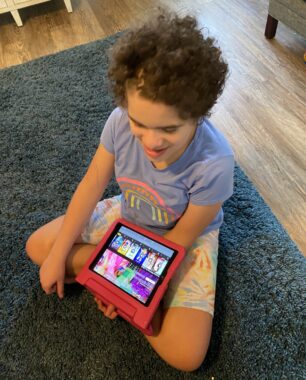Despite iPad incidents, my Angel’s screen time is good practice
Progress and provocation as an Angel learns how to use an iPad

Working to keep your Angel out of apps on their iPad is an excellent problem to have. I love that my 13-year-old Angel, Juliana, knows her way around her device. But her exploration is becoming troublesome. As Juliana becomes proficient with her screen, I’m working overtime to keep her out of some areas.
I’m trying not to be frustrated with Juliana’s iPad trolling, mainly because the device is great practice for her. Fine motor skills, muscle memory, and pointing are among the benefits of using it. Yet while the benefits far outweigh the inconveniences, they come with a price.
Twice Juliana has managed to toggle into my Netflix account and upgrade our plan. Thank goodness that has been the only financial mishap. Juliana has a child account that is linked to my account as her parent. It took me a while to figure out the random files with odd “words” typed into them. The trail of gibberish led back to Juliana. With all of the parental controls in place, you would think incidents like this are impossible. Unfortunately, they are not.
The early bird
Juliana first began working on her iPad when she was 3. This credit goes to her early intervention speech therapist who knew the importance of building her skills over the years. To use her talker, or augmentative and alternative communication device, effectively, Juliana must isolate and use her pointer finger. She’s still working on this skill, but she’s come quite far.
Using her iPad helps with this development. She gets plenty of practice by choosing music, games, and shows on her iPad. Her pointer skills are a huge part of her success with her talker. When I meet new special needs parents, I advise them to get their kiddo on a device as soon as they can. My advice is usually met with an odd look. Then, I tell them about Juliana’s progression from beating to swiping, and now selecting, choices on her device.
Find, choose, repeat
When I changed Juliana’s software on her talker in December, I knew muscle memory would be essential to her using the new app. Muscle memory is a repetitive motion that leads to improvement. With her new app, selections appear in the same spot no matter how many options I add to a category.
Use of her talker will grow to mastery through practice and repetition. And she gets plenty of practice hunting around her iPad. When I hide apps, she swipes and selects until she finds something new to explore. Find My, Compass, and Garage Band apps have all been targets of hers.
These scavenger hunts also led to my current whack-a-mole problem. No matter how much I lock her screen or move the apps, she will find the tiniest space to get out of one and into another. The guided access feature on her iPad is a saving grace. But one missed click means that we’ve left her device unlocked. Sometimes the feature misbehaves and leaves small choices like screen casting at her disposal. When a random TV lights up in the house, we know it’s Juliana’s handiwork.

Juliana sits innocently with her iPad after weaseling out of an app a few minutes earlier. (Photo by Sabrina L. Johnson)
Communication is worth the cost
I love this curiosity of hers, but it’s also driving me nuts! The other morning, I was lying in bed when I heard music coming from Juliana’s room at full blast. It meant that the guided access had failed and she had pushed the iPad volume to the max.
To hike up the volume means that she is isolating her finger to control the level. Sometimes she’ll turn the volume back down. But that doesn’t always happen. Although these little hiccups are inconvenient, she’s still getting good practice for her talker.
It’s really hard to be mad at that.
However bothersome, these moments of annoyance are worth it in the long run. Juliana is fine-tuning her skills, which will strengthen her communication. With that as a benefit, I’ll gladly endure a few more unauthorized account upgrades.
Note: Angelman Syndrome News is strictly a news and information website about the disease. It does not provide medical advice, diagnosis, or treatment. This content is not intended to be a substitute for professional medical advice, diagnosis, or treatment. Always seek the advice of your physician or other qualified health provider with any questions you may have regarding a medical condition. Never disregard professional medical advice or delay in seeking it because of something you have read on this website. The opinions expressed in this column are not those of Angelman Syndrome News or its parent company, Bionews, and are intended to spark discussion about issues pertaining to Angelman syndrome.








Leave a comment
Fill in the required fields to post. Your email address will not be published.